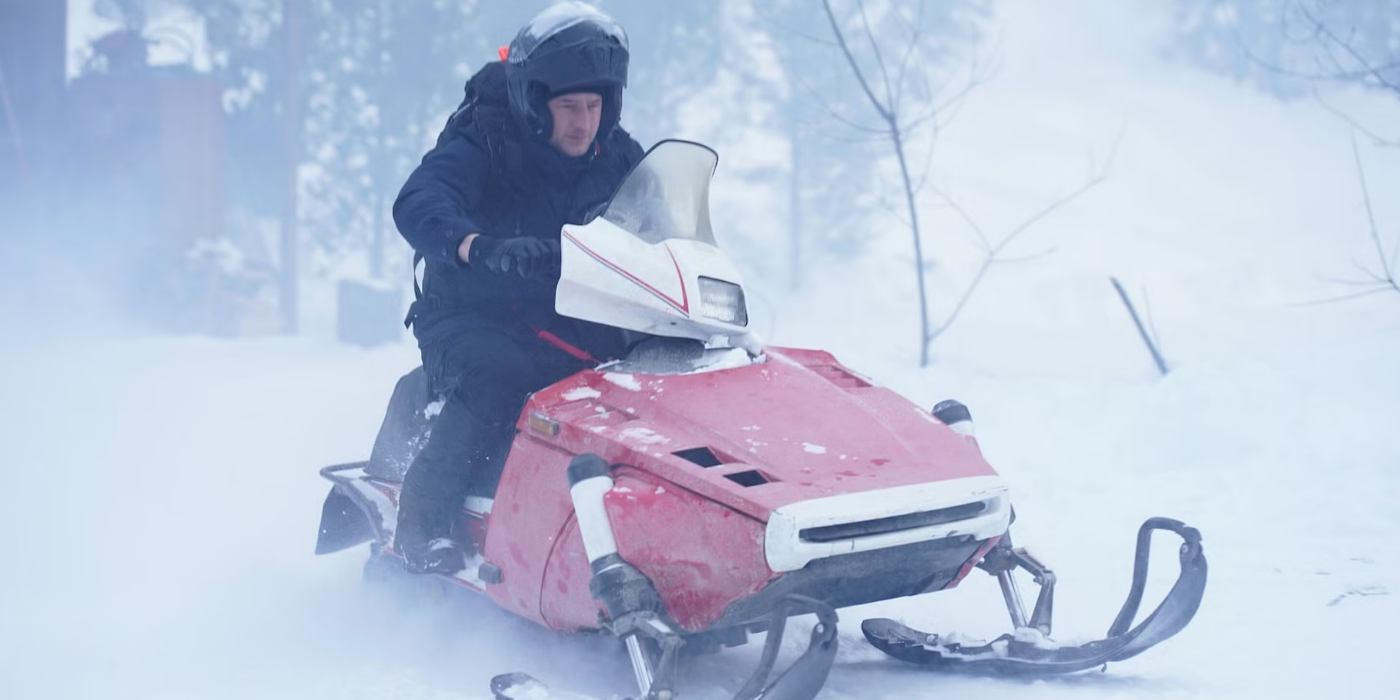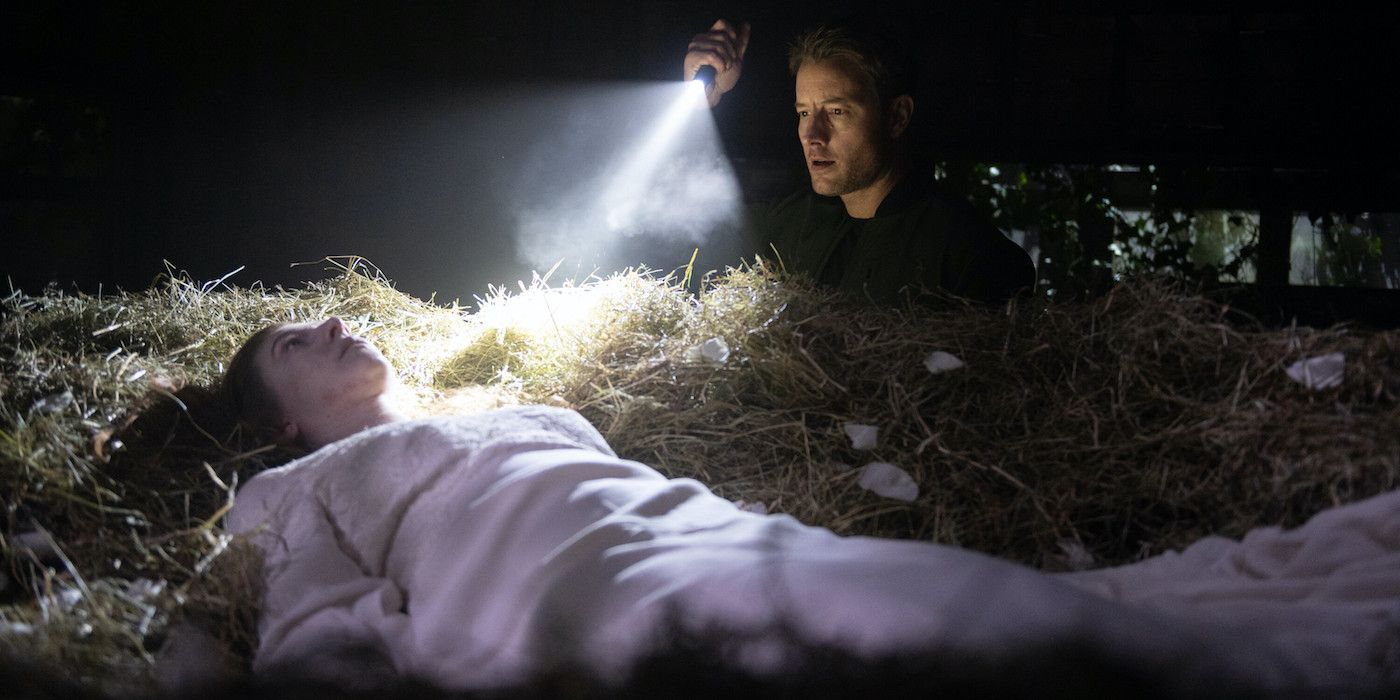
What is so great about a show like Tracker is that it can explore various genres without feeling like Colter Shaw’s (Justin Hartley) adventures are getting either too out of hand or stretching beyond belief. Because of the show’s basic premise — “rewardist” travels the country collecting rewards for missing people — there is a lot of wiggle room when it comes to the sorts of stories a network series like this chooses to tell. Thus far, the series has explored the world of government espionage, gritty serial killers, and even cult behavior. But in this week’s “The Mercy Seat,” Tracker took a dark turn to become a twisted survival thriller straight out of a backwoods horror flick. To be honest, the show should do this more.
‘Tracker’ Raises the Stakes With Its Twisted Survival Thrillers

While “The Mercy Seat” was certainly not everyone’s cup of tea, the episode threw Colter and his buddy Roger McLaren (Diego Klattenhoff) head-first into the Montana wilderness as they search for a pair of girls who went missing. Things quickly go from bad to worse when the weather picks up and, after first finding said girls, they encounter a group held up in a cabin. The problem is that this is a group of killers led by the deranged Father Ammon (Sean Bridgers), who has been on the loose in the mountains for (at the very least) a decade. Because of this, one victim, a woman named Amelia (Ariana Guerra), has been their captive for nearly a decade, being beaten, tortured, and God-knows what else in all that time.
“The Mercy Seat” is a pulse-pounding thriller that takes Tracker to new heights, going beyond the standard procedural formula we’re used to seeing and raising the stakes on every level. It’s a fantastic episode of television, and one that gets under your skin as you hope and pray that Colter will rescue these girls from each new danger in time. One aspect that works particularly well here is the elemental horror, which becomes a major factor as the snow storm picks up, stranding our hero in the wilderness with no way to call for help. You’ll be hard-pressed to find a network television series that’s willing to actively work in snowy conditions, but the weather is a major factor (arguably its own character) in this episode. Without it, the suspense and immediate threat in the first half (not to mention the tension that builds as a result of Colter being “off-grid”) wouldn’t quite work.
But a good horror story only works if the threat is more real than simply bad weather. The introduction of Ammon and his deranged family turns the dial up to eleven as Colter and these girls are forced to endure this fresh hell that will soon use and abuse them. It’s an inspired way to elevate this story from your standard survival fare into something far more intricate and deadly, and it works quite well. Of course, this is not the first time that Tracker has strayed into horror territory. Season 1’s “Aurora” leaned into the psychological horror subgenre with Maeve Price (Bronwen Smith), a murderer who locked a teenage girl in a closet for three years before Colter found her. Likewise, the following episode, “Into the Wild,” introduced a horrific mob enforcer played by Peter Stormare who feels like something out of a Friday the 13th-inspired slasher.
‘Tracker’s Premise Lends Itself to Horror

The truth is, many episodes of Tracker are borderline horror stories. The entire Season 2 arc surrounding the abduction of Gina Pickett (Lina Lecompte) by the serial killer known as “The Teacher” (Nicholas Lea), which comes to a head in “The Disciple,” feels like a dark mix between a Silence of the Lambs-inspired psychological thriller and a straight-up horror story. Including villains like Peter Storemare’s Valtz character or The Teacher into the Tracker canon opens the door for far more horrific possibilities in the future. Possibilities that, frankly, deserve to be explored more regularly. Given that many who have disappeared without a trace could be said to have been kidnapped or worse, the real-world terrors that Colter encounters almost daily would naturally explore the darker side of human nature. For Tracker to ignore that would be disingenuous, so to lean in further and dive into those stories is the only natural conclusion.
Horror is a genre that has the unique ability to explore the darkest aspects of humanity while saying something meaningful about them. Admittedly, not every horror flick does just that (and certainly other genres have this ability as well), but the way that Tracker frames these tales, there is always a choice for someone to succumb to that darkness or to reject it. In the case of “The Mercy Seat,” what makes this Tracker hour so compelling isn’t simply the unbalanced mountain family who torture and abuse their victims, but Amelia’s part in it as an unwilling participant who chooses to reject those she has been stuck with for nearly a decade. It’s a harrowing picture that Tracker paints here, but one that it manages to do quite well, offering Colter Shaw as a sort of salvation for those who would be swallowed up by the world’s evils.
The balance that Tracker can bring to these horror tales — emphasizing the darkness while simultaneously highlighting Colter’s capacity for good — is really what makes episodes like these work. Of course, Tracker isn’t the only show to have done this. Other procedurals like Criminal Minds and The X-Files have certainly wandered into straight-up horror territory over the years. One might even consider Bones‘ serial killer story something out of a psychological horror, despite airing on network television. Though Tracker does not deal exclusively with these terrifying aspects of reality, whenever it does, we can’t help but walk away feeling as if we’ve seen a glimpse at something truly evil, something that could just as easily lurk around the corner. Thankfully, there is far more to Tracker than these standalone horror episodes, even if we would like a few more of them next season.
‘Tracker’ Shouldn’t Be a Straight-Up Horror Show, but It Should Continue To Push the Boundaries
All this to be said, as much as we want Tracker to continue exploring these standalone horror stories (because standalone adventures are what this show does best), the show should never limit itself to simply this genre. Stories like “Ontological Shock” or “Neptune,” which delve into government conspiracies and espionage, wouldn’t be possible if Tracker were a horror-only show, nor would organized crime-related tales like “Shades of Gray” or “Out of the Past.” In fact, the entire mythology of the show, surrounding Colter’s mysterious past and whatever occurred the night his father died, strays distinctly from classic horror fare.
Because these stories are just as valuable and important to the larger Colter Shaw story, they offer different perspectives on the world around us that horror simply cannot. More than that, they’re just as entertaining. Part of what makes Tracker great is that it’s an action series with fun twists and turns along the way, and we can’t help but love seeing Colter thrown into new types of adventures on a weekly basis, horror or not.
